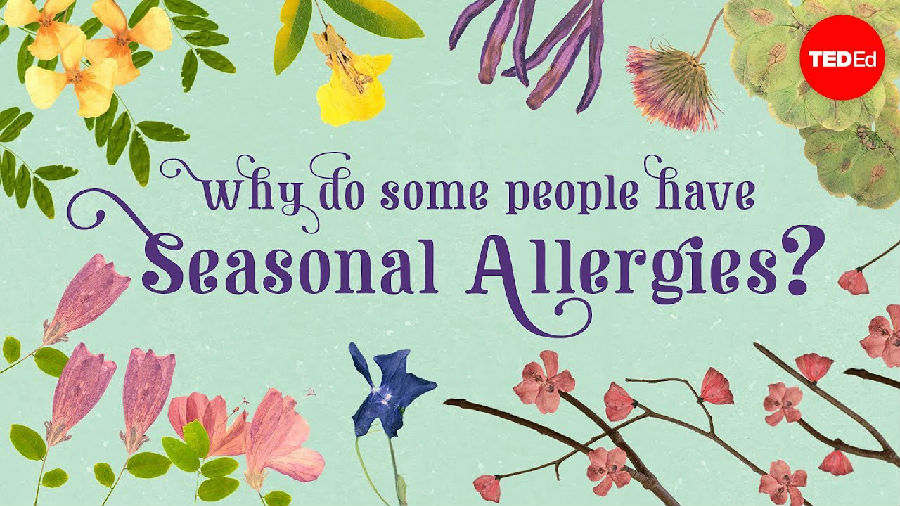(单词翻译:单击)
Ah, spring. Grass growing, flowers blooming, trees growing new leaves,
啊,春天。青草生长,百花绽放,树木萌发出新叶,
but if you get allergies, this explosion of new life probably inspires more dread than joy.
但如果你有过敏,探索这片生机或许就意味着悲大于喜。
Step outside, and within minutes, you're sneezing and congested.
走出室外,不出几分钟,你就会打喷嚏并感到呼吸困难。
Your nose is running, your eyes are swollen and watery, your throat is itchy.
你会流鼻涕,你的眼睛会肿胀并流泪,你感到喉咙发痒。
For you and millions of others, it's seasonal allergy time.
对于你和与你相似的几百万人来说,这就是季节性过敏的征兆。
So what's behind this onslaught of mucus?
所以隐藏在这一系列粘液侵袭背后的是什么呢?
The answer lies within you. It's your immune system.
答案就在你身上。是你的免疫系统。
Seasonal allergies, also called hay fever, or allergic rhinitis,
季节性过敏,也被称为花粉病、过敏性鼻炎,
are a hypersensitive immune response to something that's not actually harmful.
是免疫系统对于并没有危害的物质的过激反应。
Pollen from trees and grass, and mold spores from tiny fungi find their way into your mucous membranes
来自树上和草地上的花粉,和来自真菌的霉菌孢子都能够进入你的黏膜,
and your body attacks these innocuous travelers the same way it would infectious bacteria.
而你的身体就会像对待感染性细菌一样攻击这些无辜的来访者。
The immune system has a memory.
免疫系统是有记忆性的。
When a foreign substance gets tagged as threatening,
当外来物质被标记为有威胁的时候,
white blood cells produce customized antibodies that will recognize the offender the next time around.
白细胞就会分泌出相应的抗体,在下一次识别出入侵者。
They then promptly recruit the body's defense team.
它们到时就会启动身体的防御系统。
But sometimes, the immune system accidentally discriminates against harmless substances, like pollen.
但有时候,免疫系统会不小心排斥无害物质,例如花粉。
When it wafts in again, antibodies on the surface of white blood cells recognize it and latch on.
当它再次出现,白细胞表面的抗体就会立刻识别出来并将其锁定。
This triggers the cell to release inflammatory chemicals, like histamine,
这就会导致细胞分泌炎症性化学物质,例如组胺,
which stimulate nerve cells, and cause blood vessels in the mucous membranes to swell and leak fluid.
它可以刺激神经细胞,使得黏膜内的血管肿胀并分泌液体。
In other words, itchiness, sneezing, congestion, and a runny nose.
换句话说,就是发痒、打喷嚏、呼吸困难、流鼻涕。
Allergies usually, but not always, show up for the first time during childhood.
过敏通常第一次出现在童年时期,但不是所有人都是如此。
But why do some people get allergies and others don't?
但为什么一些人会过敏而另一些人没有?
Allergies tend to run in families, so genetics may be one culprit.
过敏倾向于在家族中出现,所以基因是罪魁祸首之一。
In fact, errors in a gene that helps regulate the immune system are associated with higher rates of allergies.
事实上,调控免疫系统的基因发生错误,与高过敏率息息相关。
The environment you grow up in matters, too.
你成长的环境也是有关联的。
Being exposed to an allergen as a baby makes you less likely to actually develop an allergy to it.
在婴儿时期接触到过敏原,使得你更小几率对其产生过敏。

People who grow up on farms, in big families, and in the developing world also tend to have fewer allergies,
那些成长在农场里,尤其是在大家族,和发展中国家的人过敏的更少,
although there are plenty of exceptions, partly thanks to genetics.
虽然一部分是由于基因引起的,但还是会有很多的例外。
One theory is that as children,
一个理论是作为儿童,
they encounter more of the microbes and parasites that co-evolved with traditional hunter-gatherer societies.
他们会接触到更多从传统狩猎采集社会就开始演化的微生物以及寄生虫。
Called the hygiene hypothesis, the idea is that when the immune system isn't exposed to the familiar cast of microbes,
这被称为卫生假说,这个观点是当免疫系统不能接触到一些常见的微生物时,
it'll keep itself busy mounting defenses against harmless substances, like pollen.
它们就会一直增加对于无害物质的防御措施,比如花粉。
Another theory is that an immune system toughened up by a barrage of pathogens is less likely to overreact to allergens.
另一个理论是如果免疫系统经受过大量病菌的洗礼,就不会对过敏原产生过激反应。
Pollen is a common offender, just because we encounter so much of it, but there's a long list of substances:
花粉是常见的入侵者,是因为我们经常能够遇到,但还有很多其他类似的物质:
dust, animal dander, insect venom, medications, certain foods, that can send your immune system into overdrive.
如灰尘、动物皮屑、昆虫毒液、药物、特定食物,它们会使得你的免疫系统过度工作。
Some of these reactions can be scary.
其中的一些反应可以是很可怕的。
An allergy can develop into full-blown anaphylaxis,
某些过敏能够发展为完全性过敏,
which typically brings on severe swelling, shortness of breath, and very low blood pressure. It can be deadly.
从而导致严重的肿胀、呼吸急促以及低血压,这可能致命。
The body can even have an allergic reaction to itself causing auto-immune disorders,
人体甚至可能对自身产生过敏,造成自身免疫性疾病,
like multiple sclerosis, lupus, and type 1 diabetes.
像各种硬化症、狼疮、I型糖尿病。
But even non-life threatening allergy symptoms can make you miserable, so what can you do about it?
但即使是不致命的过敏症也能让你苦不堪言,所以我们能对它们做些什么呢?
Medications can help reduce the symptoms.
药物能够帮助减轻症状。
The most common ones keep histamines from binding to your cells.
最常见的能够防止组胺与细胞结合。
These antihistamines stop the inflammation response.
这些抗组胺剂能够防止炎症反应。
Steroids can help dial down the immune system.
类固醇能够帮助平稳免疫系统。
Another more permanent option is immunotherapy.
另外更长久的做法是免疫疗法。
Deliberate, controlled exposure to gradually increasing amounts of an allergen
在科学控制下,特定地暴露于数量逐渐增加的过敏原,
can teach the immune system that it isn't dangerous after all.
可以让免疫系统知道这些物质并不危险。
And if you're really adventurous, there's a less traditional option: intestinal parasites.
如果你敢于冒险,还有一种不太传统的做法:肠道寄生虫。
When hookworms sink their teeth into the intestinal wall, they secrete chemicals that blunt the immune system.
当十二指肠虫将牙齿嵌到肠壁,它们会分泌化学物质使得免疫系统迟钝。
Some studies suggest that hookworms can treat allergies,
一些研究认为十二指肠虫能够治疗过敏,
which may be another reason allergies are more common in industrialized countries where hookworms are few and far between.
这也解释了为什么过敏在工业化的国家更常见,那儿的十二指肠虫相对较少。
Of course, you can always just wait your seasonal allergies out.
当然,你也可以等着季节性过敏过去。
The spring pollen onslaught dwindles by mid-summer, just in time for ragweed season.
春季花粉侵袭在仲夏就会减少,正好赶上豚草的季节。


